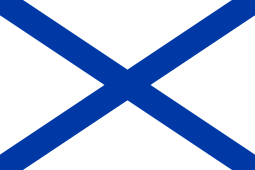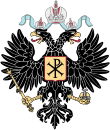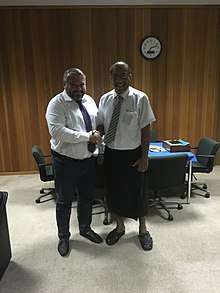Romanov Empire (micronation)
| Romanov Empire Романовская Империя (Russian) | |
|---|---|
 Flag
 Coat of arms
| |
| Status | Current |
| Capital |
St. Nicholas 13°21′N 16°47′W / 13.350°N 16.783°W |
| Official languages | Russian |
| Ethnic groups | Russians |
| Religion | Eastern Orthodox (official) |
| Government | Constitutional monarchy |
• Emperor | Nicholas IIIa |
| Prince Anton Bakov | |
| Independence | |
• from the Gambia | 1 December 2017 |
| Area | |
• Total | 10 km2 (3.9 sq mi) |
| Population | |
• Estimate | 5,000 |
| Membership | ~5,000b |
| Currency | Bitcoin |
| Time zone | GMT |
| |
The Romanov Empire (Russian: Романовская Империя[2][3]), also known as the Imperial Throne (Russian: Императорский Престол[4]), formerly the Russian Empire (Российская Империя), is a state proposed by Russian businessman and politician Anton Bakov as a re-creation of the Russian monarchy. It would be led by Romanov pretender Prince Karl Emich of Leiningen as Emperor Nicholas III, with Bakov serving as Archchancellor.
By 2017, talks with heads of several countries were held to purchase a territory to establish a "non-micro" state: these included Montenegro, Macedonia, Albania, The Gambia, Antigua and Barbuda and Kiribati. In early 2017, it was reported that the Romanov Empire's founder Bakov was interested in acquiring three islands belonging to Kiribati in order to establish a "revived Romanov Empire".[5] On 24 February 2017, the Kiribati government rejected Bakov's proposal for the islands.[6] Bakov later claimed it wasn't the final decision and that it was related to an inner Kiribati political struggle.[7]
On 1 December 2017, the Memorandum of Friendship and Cooperation between The Republic of The Gambia and Romanov Empire was signed in Banjul by the Secretary General of The Gambia, Dawda Fadera, and the Minister of Foreign Affairs of Romanov Empire, Modou Lamin Saidykhan,[8][9] and on 6 December Bakov stated that the Romanov Empire was in talks with five other undisclosed countries.[1] However, on 12 December the Gambia denied that such a memorandum was signed.[10]
History
2011–2013
Bakov declared the new Russian Empire to be the successor to the historical Russian Empire that ceased to exist in 1917. The Imperial Throne also claimed the right to maritime territories that were either claimed by the Russian Empire or discovered by the Imperial Russian Navy but never absorbed into the Soviet Union.[11] The 17 claimed territories include the entire continent of Antarctica and land under the jurisdiction of Japan, the United Kingdom, the United States, and other nations.[12]
Bakov declared himself prime minister and announced a constitution and state symbols.[13] The empire began to issue its own passports online for 1,000 rubles (US$31),[14] and by 2014 it claimed it had granted about 4,000 passports to citizens.[15]
Proponents of the new Russian Empire purport it to be the successor of the historical Russian Empire founded by Peter the Great in 1721. As such, the nation stakes its claim to unpopulated territory that belonged to the historical Russian Empire through "right of discovery", but which was not claimed by the Soviet Union after the 1917 Russian Revolution. It does not claim land that was part of the historical Russian Empire that is now part of Finland, Poland, or the former Soviet republics.[11]
In June 2012, Bakov registered the Monarchist Party with the Russian Ministry of Justice,[14] with a stated goal of restoring the monarchy to Russia in accordance with law. It is the only legalised monarchist party in Russia. In the fall of 2013, Bakov's daughter Anastasia Bakova (Анастасия Бакова) was the Monarchist Party's candidate in the mayoral elections in Yekaterinburg.
In July 2013, Bakov claimed his nation granted citizenship to the stateless Edward Snowden, who at the time was in Moscow Sheremetyevo Airport seeking amnesty in Russia.[16]
Accession of Prince Karl Emich
On 31 March 2014, under the new name of the Imperial Throne, the micronation issued a manifesto announcing itself a sovereign nation and declaring that Prince Karl Emich of Leiningen (born 1952) had become its head with the title of Nicholas III, Emperor of All Russia, as a successor to Nicholas II. The title claim emerged upon the Prince's conversion from Lutheranism to Eastern Orthodox Christianity on 1 June 2013.[17] Karl Emich descends from the House of Romanov through his grandmother, Grand Duchess Maria Kirillovna (1907-1951), eldest child of Grand Duke Kirill Vladimirovich, who in 1924 claimed the Russian crown from exile following the execution of his cousin Nicholas II in 1918.
The Imperial Throne claimed that by his conversion, Prince Karl Emich had fulfilled the accession requirements of Articles 35 and 53 of the Fundamental Laws of the Russian Empire last established in 1906. Prince Karl Emich accepted the Orthodox name "Nikolai Kirillovich" (Николай Кириллович) to become Nicholas III, and his (third) wife, née Countess Isabelle von und zu Egloffstein, who also converted, accepted the name "Yekaterina Fyodorovna" (Екатерина Фёдоровна).[17]
The manifesto and new constitution, signed by Nicholas III, proclaimed the goal of the Imperial Throne as consolidating people all over the world devoted to Christian monarchism. In this document, the Imperial Throne renounced all territorial claims of the Russian Empire (micronation).[17]
Romanov Empire aims to use modern technologies and plans to use cryptocurrencies, declaring bitcoin the national currency and seeking investments via Initial coin offering.[18][19]
Constitution and bylaws
According to its constitution, "the Imperial Throne is a sovereign state, a constitutional monarchy, the successor of the All-Russian Imperial Throne, and its claimed "predecessor", the Roman and Byzantine thrones. Romanov Empire is the only state in the world in which the principle of sortition is used to form the upper House of Parliament of the State Duma."[4]
Council of ministers
The nation's website proclaims a council of ministers (similar to the council of ministers set up by the actual Russian Empire), composed of the following:[20]
- Prince Anton Bakov — Chairman
- Stanislav Belkovsky — Deputy Chairman
- Tatiana Ignatova — Minister of Finance
- Mikhail Strass — Minister of Bread and Land
- Mikhail Verskajn — Minister of the Imperial Palace
- Kirill Zhesterov — Minister of Justice
- Modou Lamin Saidykhan — Minister of Foreign Affairs
- Prince Ilya Bakov — Minister of Investment
Geographic area

Proposed imperial palace and further talks
After he was named Emperor, Nicholas III wrote a letter to Vladimir Putin requesting land in Yekaterinburg to establish a capital with its own imperial senate.[21] The request was denied.[22]
In 2014, Bakov announced that he had purchased a 96 hectares (0.96 km2) plot of land in Nikšić, Montenegro to build an imperial palace along with a Russian cultural center and Orthodox monastery.[23] Also in early 2015 Imperial Throne representatives claimed to be in talks with the authorities of the neighboring Republic of Macedonia and Albania on possible collaboration and future state recognition. Bakov held a meeting with Macedonian Prime Minister Nikola Gruevski.[24] Later there were talks with President of Gambia Yahya Jammeh at the 70th UN General Assembly session.[25] Also, talks were held with Macedonian and Montenegro Eastern Orthodox clergy — Bakov discussed creation of churches associated with Imperial Throne and proposed canonization of Russian ruler Ivan III and his wife Sophia Palaiologina, who played significant roles in bringing Christian monarchy to Russia.[26] Talks with Gaston Browne, Prime Minister of Antigua and Barbuda, also took place.[27]
Kiribati developments
In May 2016 talks were held with the government of Kiribati.[28] Later in 2016 talks were continued and in early 2017 it was announced by Radio New Zealand[5] that the Kiribati government had agreed to assign three uninhabited islands in its Line Islands: Malden Island (for the Capital), Caroline Island and Starbuck Island. This may indicate future state recognition, and transformation from micronation to sovereign nation. Later updates clarified that there are plans for an immediate injection of US$120 million into the Kiribati economy that will be followed by US$230 million of investments in construction of infrastructure at Malden island: hotels, fish factories and more.[29] According to Bakov, "a great number of Russian patriots who are not happy with Putin’s regime" are expected to arrive when the initial constructions are completed.[30][31] From these times, the project has been branded under the new main name of the Romanov Empire.[29][32]
Gambia developments
Bakov has been in similar talks with Gambia since 2012.[33] In December 2017 he announced that the proposed declaration of partnership was finally signed and new Gambia authorities, headed by Adama Barrow, had recognised the Romanov Empire. Bakov's land development companies now plan to create artificial islands in the vicinity of Gambia's capital, Banjul, to establish territory for the Empire. The 6-year design works and talks took $6 million, and follow by talks on recognition with five other undisclosed countries.[1] Furthermore, Bakov has proposed that Russian Olympic athletes, who were recently denied attendance to the 2018 Winter Olympics, compete under Romanov Empire flag.[34]
Former claimed territory
There are 17 lands and islands discovered by the Imperial Russian Navy that the Russian Empire (micronation) claimed until 2013:[12]
- Suwarrow Atoll discovered by Mikhail Lazarev;
- Antarctica discovered by Lazarev and Fabian Gottlieb von Bellingshausen;
- Bellinghausen Atoll discovered by Otto von Kotzebue;
- Escholtz Atoll discovered by Kotzebue;
- Vostok Island discovered by Bellingshausen;
- Toke Atoll discovered by Kotzebue;
- Tuanake Atoll discovered by Bellingshausen;
- Hiti Atoll discovered by Bellingshausen;
- Erikub Atoll discovered by Kotzebue;
- North Borodino Island discovered by Zakhar Panafidin;
- South Borodino Island discovered by Panafidin;
- Visokoi Island discovered by Bellingshausen;
- Zavadovskiy Island discovered by Bellingshausen;
- Leskov Island discovered by Bellingshausen;
- Lisianski Island discovered by Adam Johann von Krusenstern;
- Panafidin Island discovered by Panafidin;
- Peter I Island discovered by Bellingshausen.
Symbols
The coat of arms of the "Russian Empire" consisted of a double-headed eagle, holding a hammer and sickle in its talons. The flag of the empire is the St. Andrew's Cross, which was the Russian Navy Ensign.[13]
With the transformation into the Imperial Throne, the coat of arms was changed to a black Russian Imperial Eagle with the Chi Rho symbol in the escutcheon. Bakov emphasized the Chi Rho symbolizes the formation of the Christian Monarchy in the Roman Empire by Constantine the Great who saw the symbol in the skies before the Battle of the Milvian Bridge in 312 AD. The eagle holds in its talons the sceptre and globus cruciger, two of the most prominent symbols of Christian monarchy.
References
- 1 2 3 "Антон Баков позвал всех подданных Романовской империи в Африку. "Пока там можно только поплавать"". 66.ru. Retrieved 4 June 2018.
- ↑ "Закон "О равнозначности наименований Суверенное государство Императорский Престол и Романовская Империя"". Russianempire.org.
- ↑ Устинов, Александр. "Принят Закон "О равнозначности наименований Суверенное государство Императорский Престол и Романовская Империя"". Rupolit.net. Retrieved 4 June 2018.
- 1 2 КОНСТИТУЦИЯ СУВЕРЕННОГО ГОСУДАРСТВА ИМПЕРАТОРСКИЙ ПРЕСТОЛ [Constitution of the Sovereign State of the Imperial Throne]. Russianempire.org (in Russian). Retrieved 30 January 2015.
1. Императорский Престол – Суверенное Государство, конституционная монархия, правопреемник Всероссийского Императорского Престола, и предшествовавших ему Римского и Византийского Престолов
- 1 2 Russian monarchist eyes Kiribati for Romanov revival — Radio New Zealand, 4 January 2017.
- ↑ "Kiribati govt rejects Russian's proposal over islands". Radio.co.nz. 24 February 2017.
- ↑ "Президент Кирибати поддержал возрождение "империи Романовых" на островах". РБК. Retrieved 4 June 2018.
- ↑ "Russian empire plans shift from Kiribati to the Gambia". Radionz.co.nz. 9 December 2017. Retrieved 4 June 2018.
- ↑ "Антон Баков заявил о возрождении государственного статуса династии Романовых". Kommersant.ru. 6 December 2017. Retrieved 4 June 2018.
- ↑ https://www.bbc.co.uk/news/blogs-news-from-elsewhere-42324401
- 1 2 Alexandra Bayazitova; Olga Tropkina; Yelena Shishkunova (1 September 2011). Друг Немцова воссоздал Российскую империю на островке в 168 га [Friend of Nemtsov Recreated the Russian Empire on 168-hectare Island]. Izvestia (in Russian). Retrieved 30 January 2015.
- 1 2 "About". Russianempire.org (in Russian). Retrieved 30 January 2015.
- 1 2 Возрождена Российская империя [Revived Russian Empire]. Babr (in Russian). 2 September 2011. Retrieved 30 January 2015.
- 1 2 "Russian Monarchists launch own party, Romanovs protest". RT. 19 July 2012. Retrieved 30 January 2015.
- ↑ (in Russian) n:ru:Виртуальная «Российская империя» с одобрения Николая III обретает государственный суверенитет — Russian Wikinews, 15 April 2014
- ↑ Председатель Совета министров Российской Империи выписал Сноудену паспорт [Chairman of the Council of Ministers of the Russian Empire made Snowden a passport] (in Russian). Regions. 5 July 2013. Retrieved 30 January 2015.
- 1 2 3 Империя – наше прошлое и будущее? [Empire - Our Past and Future?] (in Russian). Regions. 10 April 2014. Retrieved 30 January 2015.
- ↑
- ↑ "Кандидат в президенты Антон Баков присвоил биткоину статус национальной валюты". Rupolit.net. Retrieved 4 June 2018.
- ↑ Government. Russianempire.org (in Russian). Retrieved 24 January 2018.
- ↑ "Политическая инициатива Николая Кирилловича, Принца Лейнингенского, по созданию в Екатеринбурге города-государства – Императорский Всероссийский Престол". Monpartya.ru.
- ↑ Гость «Стенда» – Антон Баков, Председатель Монархической партии России [Guest Anton Bakov, President of the Monarch Party of Russia]. Channel4 (in Russian). 2 June 2014. Archived from the original on 9 October 2014. Retrieved 30 January 2015.
- ↑ Российский политик строит императорский дворец в Черногории (in Russian). 3 June 2014. Retrieved 30 January 2015.
- ↑ "Archchancellor of Imperial Throne Anton Bakov met with the Prime Minister of the Republic of Macedonia". Imperor.net. Archived from the original on 12 May 2016.
- ↑ "Gambian press welcomes Archchancellor of Imperial throne A.A.Bakov". Imperor.net. 19 October 2015.
- ↑ "Антон Баков: Бизнесмен не ходит строем". Gosrf.ru.
- ↑ "Delegation of Imperial Throne on official visit in Antigua and Barbuda". Imperor.net. 16 December 2015.
- ↑ "The official visit of the Archchancellor of the Imperial Throne Anton Bakov to the Republic of Kiribati". Kiribati.me. 11 May 2016.
- 1 2 Roy, Eleanor Ainge (6 February 2017). "Russian millionaire details plans to re-establish Romanov empire on remote Pacific island". Theguardian.com.
- ↑ Pearlman, Jonathan (30 October 2017). "Russian businessman seeks to restore Tsarist empire overthrown in 1917 on Pacific atoll". Telegraph.co.uk.
- ↑ "Kiribati mulls 'Russian monarchy' plan". Bbc.com. 30 October 2017.
- ↑ Marson, James (16 April 2017). "This Man's Quest to Restore the Russian Empire Isn't Going Well". Wsj.com.
- ↑ "Романовскую империю монархиста Бакова признали официально". Ural.aif.ru. Retrieved 4 June 2018.
- ↑